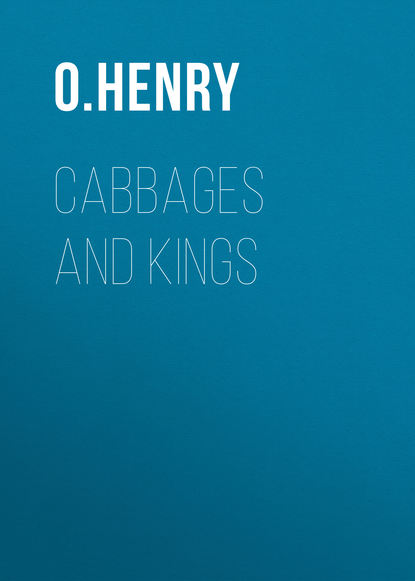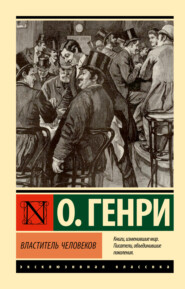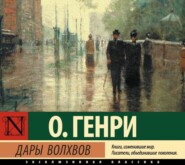По всем вопросам обращайтесь на: info@litportal.ru
(©) 2003-2025.
✖
Cabbages and Kings
Настройки чтения
Размер шрифта
Высота строк
Поля
"There's nothing," interrupted Dicky, shortly, "but this. You go tell the captain of the Catarina that Dicky Maloney wants to see him as soon as he can conveniently come. Tell him where I am. Hurry. That's all."
The consul, glad to be let off so easily, hurried away. The captain of the Catarina, a stout man, Sicilian born, soon appeared, shoving, with little ceremony, through the guards to the jail door. The Vesuvius Fruit Company had a habit of doing things that way in Anchuria.
"I am exceedingly sorry – exceedingly sorry," said the captain, "to see this occur. I place myself at your service, Mr. Maloney. What you need shall be furnished. Whatever you say shall be done."
Dicky looked at him unsmilingly. His red hair could not detract from his attitude of severe dignity as he stood, tall and calm, with his now grim mouth forming a horizontal line.
"Captain De Lucco, I believe I still have funds in the hands of your company – ample and personal funds. I ordered a remittance last week. The money has not arrived. You know what is needed in this game. Money and money and more money. Why has it not been sent?"
"By the Cristobal," replied De Lucco, gesticulating, "it was despatched. Where is the Cristobal? Off Cape Antonio I spoke her with a broken shaft. A tramp coaster was towing her back to New Orleans. I brought money ashore thinking your need for it might not withstand delay. In this envelope is one thousand dollars. There is more if you need it, Mr. Maloney."
"For the present it will suffice," said Dicky, softening as he crinkled the envelope and looked down at the half-inch thickness of smooth, dingy bills.
"The long green!" he said, gently, with a new reverence in his gaze. "Is there anything it will not buy, Captain?"
"I had three friends," replied De Lucco, who was a bit of a philosopher, "who had money. One of them speculated in stocks and made ten million; another is in heaven, and the third married a poor girl whom he loved."
"The answer, then," said Dicky, "is held by the Almighty, Wall Street and Cupid. So, the question remains."
"This," queried the captain, including Dicky's surroundings in a significant gesture of his hand, "is it – it is not – it is not connected with the business of your little shop? There is no failure in your plans?"
"No, no," said Dicky. "This is merely the result of a little private affair of mine, a digression from the regular line of business. They say for a complete life a man must know poverty, love and war. But they don't go well together, capitán mio. No; there is no failure in my business. The little shop is doing very well."
When the captain had departed Dicky called the sergeant of the jail squad and asked:
"Am I preso by the military or by the civil authority?"
"Surely there is no martial law in effect now, señor."
"Bueno. Now go or send to the alcalde, the Jues de la Paz and the Jefe de los Policios. Tell them I am prepared at once to satisfy the demands of justice." A folded bill of the "long green" slid into the sergeant's hand.
Then Dicky's smile came back again, for he knew that the hours of his captivity were numbered; and he hummed, in time with the sentry's tread:
So, that night Dicky sat by the window of the room over his shop and his little saint sat close by, working at something silken and dainty. Dicky was thoughtful and grave. His red hair was in an unusual state of disorder. Pasa's fingers often ached to smooth and arrange it, but Dicky would never allow it. He was poring, to-night, over a great litter of maps and books and papers on his table until that perpendicular line came between his brows that always distressed Pasa. Presently she went and brought his hat, and stood with it until he looked up, inquiringly.
"It is sad for you here," she explained. "Go out and drink vino blanco. Come back when you get that smile you used to wear. That is what I wish to see."
Dicky laughed and threw down his papers. "The vino blanco stage is past. It has served its turn. Perhaps, after all, there was less entered my mouth and more my ears than people thought. But, there will be no more maps or frowns to-night. I promise you that. Come."
They sat upon a reed silleta at the window and watched the quivering gleams from the lights of the Catarina reflected in the harbour.
Presently Pasa rippled out one of her infrequent chirrups of audible laughter.
"I was thinking," she began, anticipating Dicky's question, "of the foolish things girls have in their minds. Because I went to school in the States I used to have ambitions. Nothing less than to be the president's wife would satisfy me. And, look, thou red picaroon, to what obscure fate thou hast stolen me!"
"Don't give up hope," said Dicky, smiling. "More than one Irishman has been the ruler of a South American country. There was a dictator of Chili named O'Higgins. Why not a President Maloney, of Anchuria? Say the word, santita mia, and we'll make the race."
"No, no, no, thou red-haired, reckless one!" sighed Pasa; "I am content" – she laid her head against his arm – "here."
XVI
ROUGE ET NOIR
It has been indicated that disaffection followed the elevation of Losada to the presidency. This feeling continued to grow. Throughout the entire republic there seemed to be a spirit of silent, sullen discontent. Even the old Liberal party to which Goodwin, Zavalla and other patriots had lent their aid was disappointed. Losada had failed to become a popular idol. Fresh taxes, fresh import duties and, more than all, his tolerance of the outrageous oppression of citizens by the military had rendered him the most obnoxious president since the despicable Alforan. The majority of his own cabinet were out of sympathy with him. The army, which he had courted by giving it license to tyrannize, had been his main, and thus far adequate support.
But the most impolitic of the administration's moves had been when it antagonized the Vesuvius Fruit Company, an organization plying twelve steamers and with a cash capital somewhat larger than Anchuria's surplus and debt combined.
Reasonably an established concern like the Vesuvius would become irritated at having a small, retail republic with no rating at all attempt to squeeze it. So when the government proxies applied for a subsidy they encountered a polite refusal. The president at once retaliated by clapping an export duty of one real per bunch on bananas – a thing unprecedented in fruit-growing countries. The Vesuvius Company had invested large sums in wharves and plantations along the Anchurian coast, their agents had erected fine homes in the towns where they had their headquarters, and heretofore had worked with the republic in good-will and with advantage to both. It would lose an immense sum if compelled to move out. The selling price of bananas from Vera Cruz to Trinidad was three reals per bunch. This new duty of one real would have ruined the fruit growers in Anchuria and have seriously discommoded the Vesuvius Company had it declined to pay it. But for some reason, the Vesuvius continued to buy Anchurian fruit, paying four reals for it; and not suffering the growers to bear the loss.
This apparent victory deceived His Excellency; and he began to hunger for more of it. He sent an emissary to request a conference with a representative of the fruit company. The Vesuvius sent Mr. Franzoni, a little, stout, cheerful man, always cool, and whistling airs from Verdi's operas. Señor Espirition, of the office of the Minister of Finance, attempted the sandbagging in behalf of Anchuria. The meeting took place in the cabin of the Salvador, of the Vesuvius line.
Señor Espirition opened negotiations by announcing that the government contemplated the building of a railroad to skirt the alluvial coast lands. After touching upon the benefits such a road would confer upon the interests of the Vesuvius, he reached the definite suggestion that a contribution to the road's expenses of, say, fifty thousand pesos would not be more than an equivalent to benefits received.
Mr. Franzoni denied that his company would receive any benefits from a contemplated road. As its representative he must decline to contribute fifty thousand pesos. But he would assume the responsibility of offering twenty-five.
Did Señor Espirition understand Señor Franzoni to mean twenty-five thousand pesos?
By no means. Twenty-five pesos. And in silver; not in gold.
"Your offer insults my government," cried Señor Espirition, rising with indignation.
"Then," said Mr. Franzoni, in warning tone, "we will change it."
The offer was never changed. Could Mr. Franzoni have meant the government?
This was the state of affairs in Anchuria when the winter season opened at Coralio at the end of the second year of Losada's administration. So, when the government and society made its annual exodus to the seashore it was evident that the presidential advent would not be celebrated by unlimited rejoicing. The tenth of November was the day set for the entrance into Coralio of the gay company from the capital. A narrow-gauge railroad runs twenty miles into the interior from Solitas. The government party travels by carriage from San Mateo to this road's terminal point, and proceeds by train to Solitas. From here they march in grand procession to Coralio where, on the day of their coming, festivities and ceremonies abound. But this season saw an ominous dawning of the tenth of November.
Although the rainy season was over, the day seemed to hark back to reeking June. A fine drizzle of rain fell all during the forenoon. The procession entered Coralio amid a strange silence.
President Losada was an elderly man, grizzly bearded, with a considerable ratio of Indian blood revealed in his cinnamon complexion. His carriage headed the procession, surrounded and guarded by Captain Cruz and his famous troop of one hundred light horse "El Ciento Huilando." Colonel Rocas followed, with a regiment of the regular army.
The president's sharp, beady eyes glanced about him for the expected demonstration of welcome; but he faced a stolid, indifferent array of citizens. Sight-seers the Anchurians are by birth and habit, and they turned out to their last able-bodied unit to witness the scene; but they maintained an accusive silence. They crowded the streets to the very wheel ruts; they covered the red tile roofs to the eaves, but there was never a "viva" from them. No wreaths of palm and lemon branches or gorgeous strings of paper roses hung from the windows and balconies as was the custom. There was an apathy, a dull, dissenting disapprobation, that was the more ominous because it puzzled. No one feared an outburst, a revolt of the discontents, for they had no leader. The president and those loyal to him had never even heard whispered a name among them capable of crystallizing the dissatisfaction into opposition. No, there could be no danger. The people always procured a new idol before they destroyed an old one.
At length, after a prodigious galloping and curvetting of red-sashed majors, gold-laced colonels and epauletted generals, the procession formed for its annual progress down the Calle Grande to the Casa Morena, where the ceremony of welcome to the visiting president always took place.
The Swiss band led the line of march. After it pranced the local comandante, mounted, and a detachment of his troops. Next came a carriage with four members of the cabinet, conspicuous among them the Minister of War, old General Pilar, with his white moustache and his soldierly bearing. Then the president's vehicle, containing also the Ministers of Finance and State; and surrounded by Captain Cruz's light horse formed in a close double file of fours. Following them, the rest of the officials of state, the judges and distinguished military and social ornaments of public and private life.
As the band struck up, and the movement began, like a bird of ill-omen the Valhalla, the swiftest steamship of the Vesuvius line, glided into the harbour in plain view of the president and his train. Of course, there was nothing menacing about its arrival – a business firm does not go to war with a nation – but it reminded Señor Espirition and others in those carriages that the Vesuvius Fruit Company was undoubtedly carrying something up its sleeve for them.
By the time the van of the procession had reached the government building, Captain Cronin, of the Valhalla, and Mr. Vincenti, member of the Vesuvius Company, had landed and were pushing their way, bluff, hearty and nonchalant, through the crowd on the narrow sidewalk. Clad in white linen, big, debonair, with an air of good-humoured authority, they made conspicuous figures among the dark mass of unimposing Anchurians, as they penetrated to within a few yards of the steps of the Casa Morena. Looking easily above the heads of the crowd, they perceived another that towered above the undersized natives. It was the fiery poll of Dicky Maloney against the wall close by the lower step; and his broad, seductive grin showed that he recognized their presence.
Dicky had attired himself becomingly for the festive occasion in a well-fitting black suit. Pasa was close by his side, her head covered with the ubiquitous black mantilla.
Mr. Vincenti looked at her attentively.
"Botticelli's Madonna," he remarked, gravely. "I wonder when she got into the game. I don't like his getting tangled with the women. I hoped he would keep away from them."
Captain Cronin's laugh almost drew attention from the parade.

















